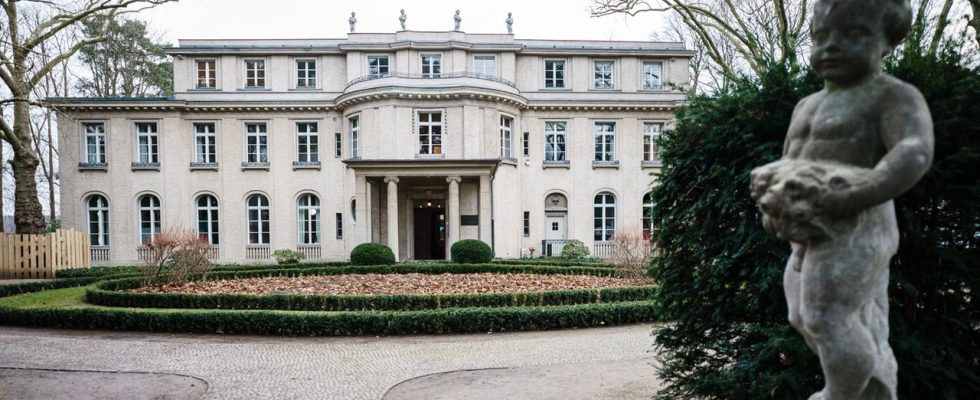interview
On January 20, 1942, the Nazis made plans to exterminate Europe’s Jewish population. The deputy memorial director explains in an interview how important the memory of the Wannsee Conference is, especially today.
tagesschau.de: On January 20, 1942, 15 administrative officials met at the Wannsee Conference House for a meeting followed by breakfast, as it was said, to plan mass murder. How do you bring this historic event closer to children and young people?
Matthias Haß: This is indeed a complex story to convey the involvement of the state administration in the organization, planning and execution of the mass murder. We have to focus on the participants and do this based on concrete history, on the basis of concrete biographies: What makes the perpetrators take part in such crimes, even at their desks? What ideology is in the background of national community and anti-Semitism?
But of course we also have to tell the story of the victims. We have to tell what happened to the people who have not only been confronted with persecution since January 1942, but who experienced exclusion, discrimination and persecution immediately after January 30, 1933? And how do they deal with it? We have to tell this specific story.
And by the way, it’s not just interesting for children and young people, but for all of us. This is a disturbing and irritating story that we need to tell. Normal state administration: people work from 9 to 5 and the goal of the work is the deportation and murder of millions of people. This is a challenge that we have to face again and again.
To person
Matthias Haß is a political scientist and deputy director of the Haus der Wannsee Conference memorial and educational center. He heads the education and research department.
“These are topics that interest young people”
tagesschau.de: It has been complained for several years that there is a great need for education about the Nazi era, especially among young people. Can you confirm from your experience that there are major gaps in young people’s knowledge of the Nazi era?
Hate: The question is twofold. One is the need for education and the second is the level of knowledge. The need for education among all of us, not only among children and young people, but also among the professional groups with which we work more intensively, is still very great. However, the level of knowledge – data, figures, facts – we can actually see that: it is decreasing.
But that is not the important thing for us. The crucial thing are the issues, the human issues, that we deal with: What do people do to each other? What happens to a group because of ideological exclusion, anti-Semitic exclusion? What about the situation of human rights? What is injustice? These are topics that interest young people. We have to start there.
They also have a right to us offering them historical education, political education at different levels, but in our area with the specific history of National Socialism. And that always arouses interest.
Remembering without contemporary witnesses
tagesschau.de: Contemporary witnesses who experienced the Nazi dictatorship themselves are gradually leaving us. In the not too distant future there will be none. How can the gap that these people leave behind in historical education work be closed?
Hate: This is of course a phenomenon that we have been observing for years, decades. The contemporary witnesses are becoming fewer and that is a painful process. At the same time, we have had the testimonies for years and decades in various forms, in video and audio form, in literary form.
Primo Levi’s survivor report, Ruth Klüger’s report. These are testimonies that are moving, impressive and with which we work. Video recordings that we know, from contemporary witnesses up to the present day, go back decades.
Karl Fruchtmann’s film “Witnesses – Statements on the Murder of a People”, which in 1981 allowed survivors to speak who, from our point of view, are surprisingly young today and who impressively report on their experiences, their survival, the dying, what they observe. Our mission is to make these testimonies more accessible and to use them, and thus also the reports of those who experienced this time, even if the contemporary witnesses are no longer with us.
Meeting in Potsdam “shocking for us too”
tagesschau.de: Last week it became known that a meeting of right-wing and right-wing extremist circles took place in a villa in Potsdam, which is just a few kilometers away as the crow flies from its memorial, the House of the Wannsee Conference. Among other things, the expulsion of people with a migration background was discussed there. What challenges arise from the resurgence of right-wing populist and right-wing extremist movements?
Hate: This is actually shocking for us too. And the references that were made, especially to the location of the Wannsee Conference, are diverse. I think we have all been surprised over the last ten years that at many points we have to carry out discussions, debates and educational work that we thought we had already left behind at some points. That’s not the case. That is a challenge.
Ralph Baudach conducted the interview for tagesschau24. It was shortened and edited for the written version.

